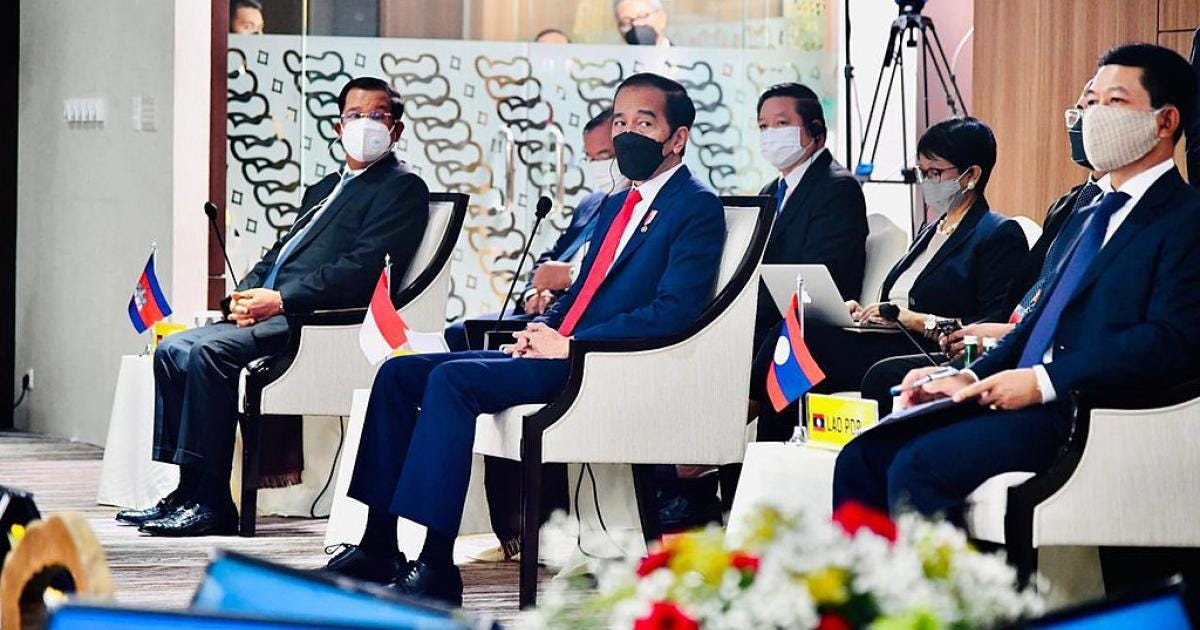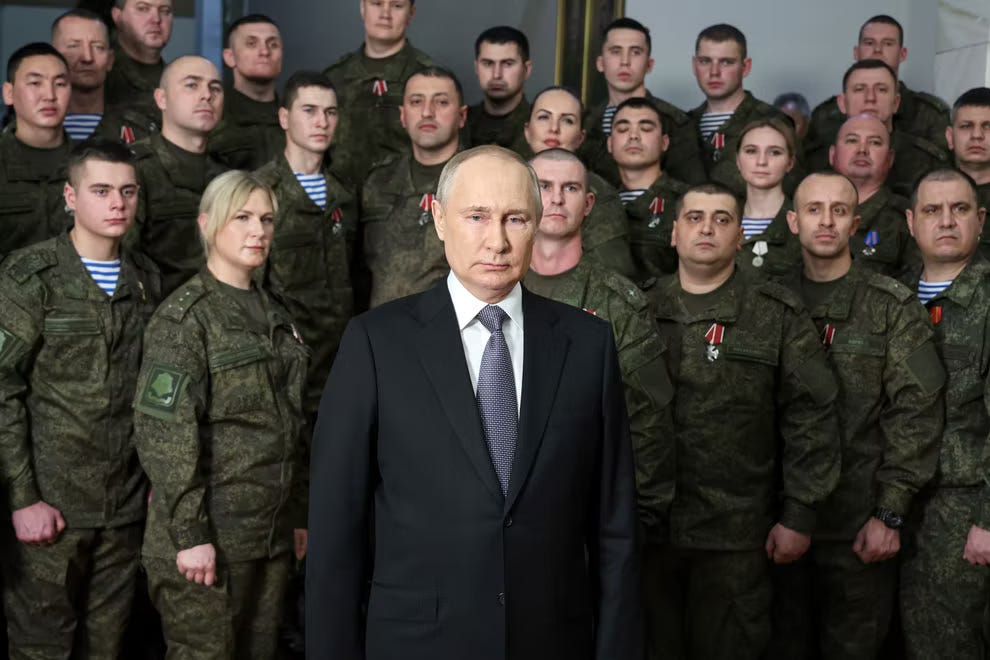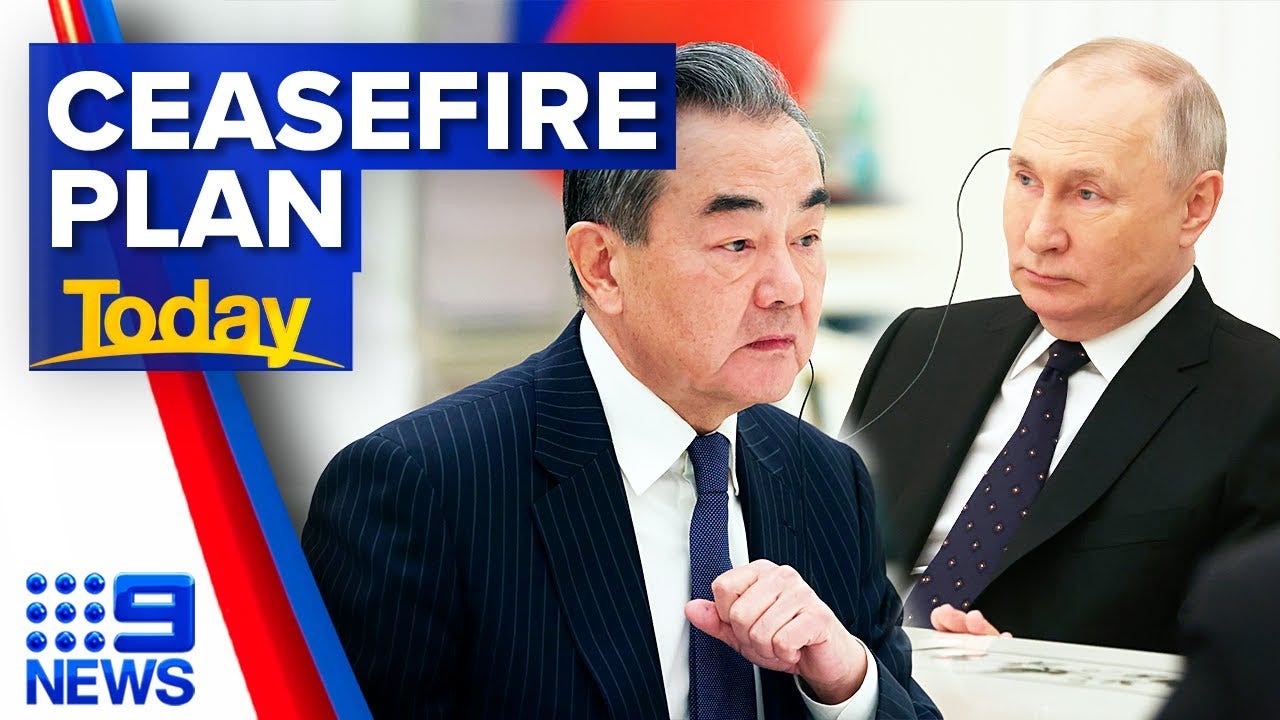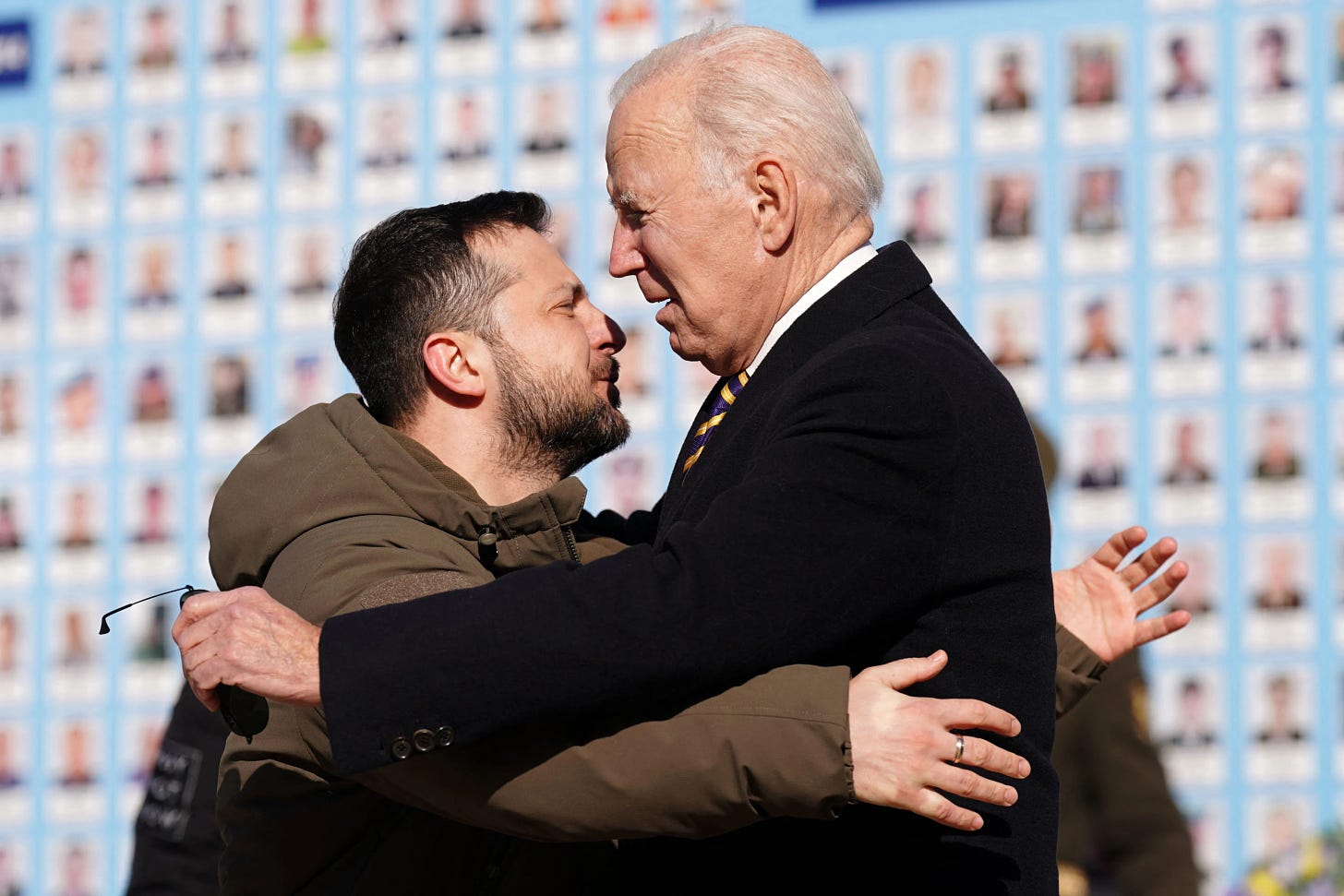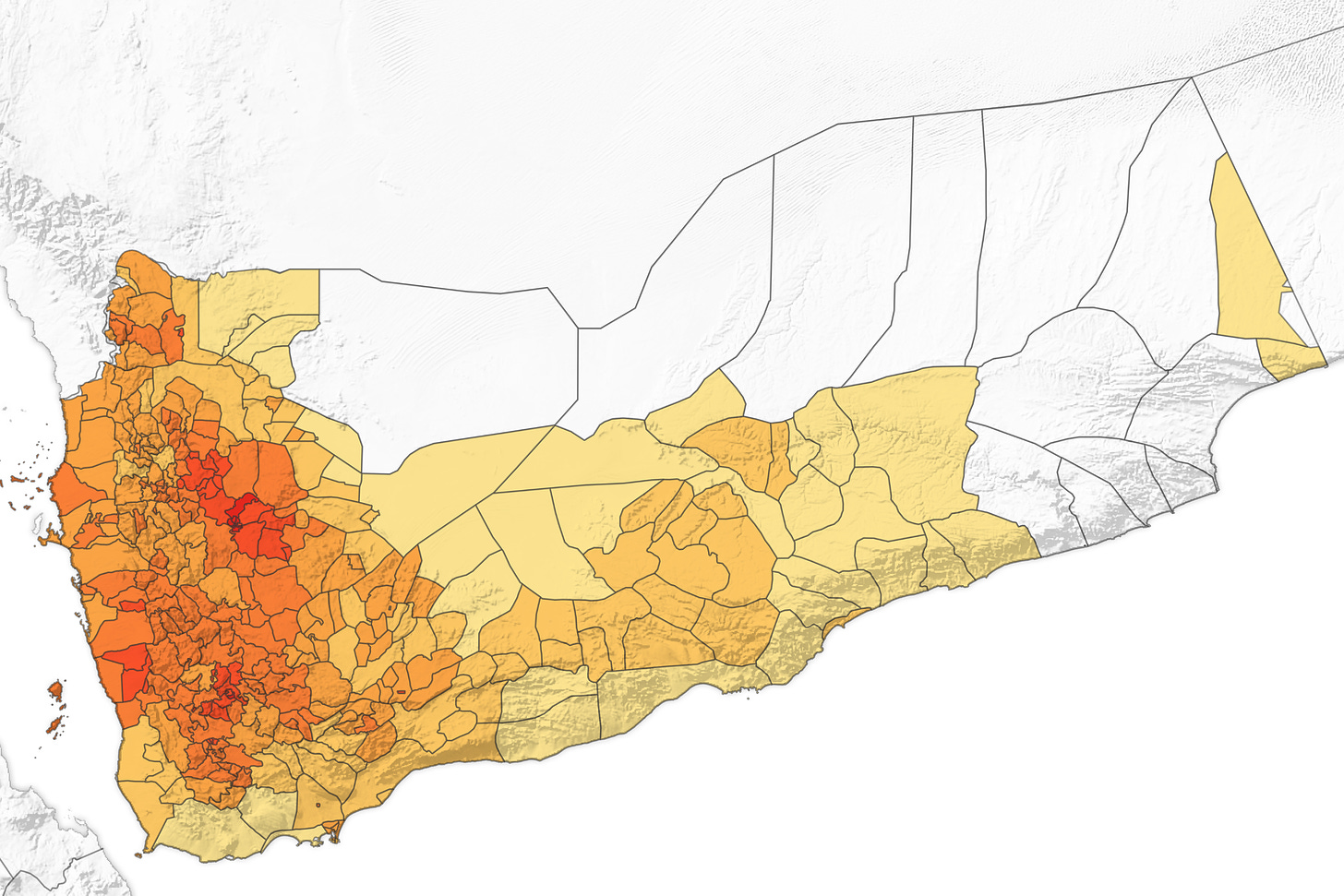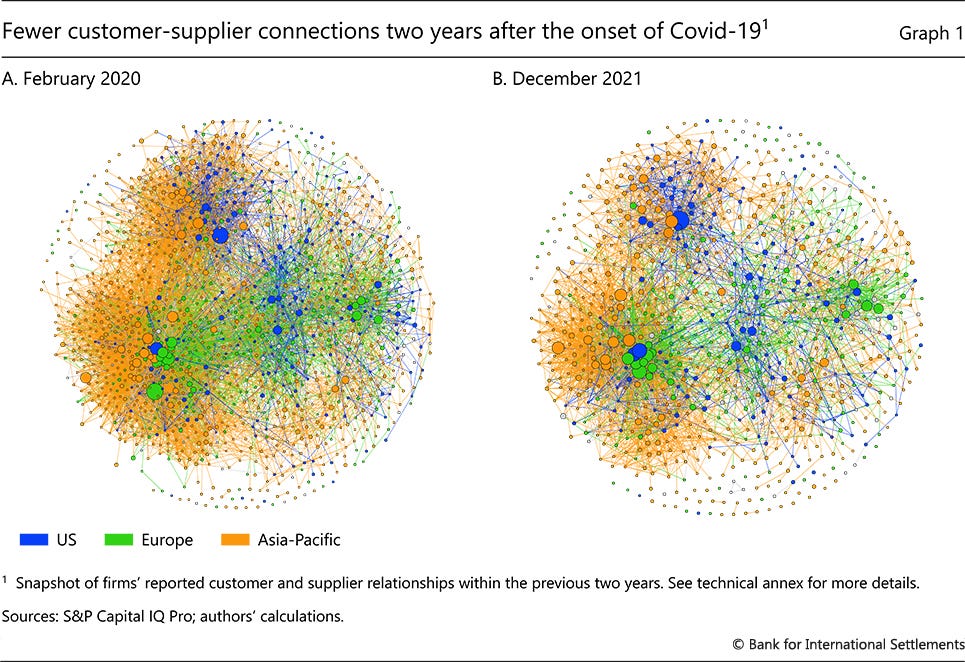Dilemma Dilemma
ASEAN inflation, food, energy and SCS. Vladimir's 5 points and Kremlin and Whitehouse view of China 12, Yemen in critical condition, Global Value Chains recover, ASEAN cinema rises
UPDATE: International Relations exists to unravel interstate dilemmas and search for pathways to resolution. Diplomacy is the art of navigating and negotiation the international topography to clear pathways to peace, prosperity and human well-being. Today, the Long Mekong Daily zooms in on multiple dilemmas before finishing with an ASEAN cinematic flourish.
Indonesia as ASEAN Chair 2023: The Dilemmas
The dire prospect of peace in Ukraine and the high inflation due to the rising price of food and energy sent notes of caution across the world, including to ASEAN economies. The International Monetary Fund (IMF) projected that about 90 percent of advanced economies will see a decline in growth in 2023 while the major engines for growth would be China and India. Consequently, emerging and developing economies are expected to improve resilience and remove key growth constraints. Key initiatives in this pillar are the development of micro, small, and medium enterprises, and the promotion of ASEAN Integration among the developing members of ASEAN to move forward in a unified manner.
Indonesia’s Chair of Senior Official Meetings revealed that the goal for bringing up ASEAN as “epicentrum of growth” is to bring more respect for Southeast Asia countries and to play a bigger role on the global stage, to reaffirm its bargaining position and recover fully from the COVID-19 pandemic. From this angle, Indonesia’s choice of theme is timely to secure ASEAN’s place in the global arena.What can Indonesia do? Ideally, as a chair Indonesia could tap into its strength in having good bilateral relations with Myanmar and the neighboring countries to explore political solutions. Thus, not to solely rely on the ASEAN mechanisms. The dilemma here is to balance ASEAN’s approach and Indonesia’s approach. Will Indonesia have the courage to offer models of nation building for Myanmar to curb violence and destabilization? Given that Myanmar has been a graveyard for any Special Envoy, this year a new approach is needed. The clock is ticking. Humanitarian agencies face difficulties in protecting themselves and their logistics when penetrating Myanmar. Each humanitarian group must generate their own local contacts. The areas controlled by the Myanmar military junta shrunk since the coup but the size of territorial control of the alternative groups are not decisive enough to gain legitimacy over people in the entire country. Yet, the military junta continues to claim legitimacy over Myanmar, approaching groups for support for the general election despite rejection from the Myanmar public. Indonesia’s intent to re-enact the plan to facilitate the voluntary return of the displaced people of Rakhine back to Myanmar is premature under such unstable political condition.
Read more here.
Vladimir Putin’s Five Points
The world should change, though Moscow is against building the new world in the interests of only one country, the US. read more here
The Russian people are second to none when they are cohesive and united. read more here
If the West manages to disintegrate the Russian Federation and assume control of its fragments the Russian people may not survive, with "Muscovites, Uralian and others remaining. read more here
Supplies of weapons to Ukraine by the NATO bloc may be considered the participation in the conflict since the alliance receives no payments for it, which means the West becomes a companion in Kiev’s crimes. read more here
The US’ satellites have joined the fight against Russia, though they realise the selfishness of Washington’s intentions. read more here
Kremlin’s view on China’s 12 points
The Kremlin on Monday said that it is paying close attention to China's 12-point peace plan for the Russia-Ukraine war which Beijing released last Friday.
"Any attempt to develop a plan that will help to transfer the conflict to a peaceful course deserves attention. We treat the plan of our Chinese friends with great attention," Kremlin spokesman Dmitry Peskov told a press briefing in the capital Moscow.
In response to a question on the details of the plan, Peskov said it should be thoroughly analyzed “taking into account the interests of the various parties," further noting: "This is a very intense process.”
On Friday, the Chinese Foreign Ministry released a statement listing the Beijing’s position on a political settlement to the war in Ukraine, where 12 points were listed, including respecting the sovereignty of all countries, ceasing hostilities, resuming peace talks, and resolving the humanitarian crisis in the region.
The plan also calls for keeping nuclear power plants safe, facilitating grain exports, and stopping unilateral sanctions, noting that “dialogue and negotiation are the only viable solution to the Ukraine crisis.”
Situation in Transnistria followed closely
Peskov also touched on tensions in Transnistria and said Moscow is closely monitoring the situation in the breakaway region, amid claims last week by the Russian Defense Ministry that Ukraine plans an "armed provocation" in the region.
The situation in Transnistria is is “very tense,” “provoked from the outside” and the the object of our closest attention and a reason for our concern,"
On Thursday, the Russian Defense Ministry claimed that Ukraine is preparing an "armed provocation" against Transnistria, currently controlled by pro-Russian separatists.
Western sanctions will continue
Peskov also said the West is experiencing a shortage of things to sanction, as the EU announced it adopted a 10th sanctions package late Friday with new trade bans and export controls on products and technologies that can be used for civilian and military purposes.
Peskov also said he is certain that the implementation of the sanctions “will not cause any discomfort” for the people involved.
Read more here.
White House view of China’s 12 points
China’s proposal for an end to Russia’s invasion of Ukraine met with scoffs from the White House over the weekend. “Putin’s applauding it, so how could it be any good?” President Biden said of the plan in an interview that aired Sunday on ABC’s “This Week.”
“I’ve seen nothing in the plan to indicate there is something that would be beneficial to anyone other than Russia,” he added.
On Friday, the one-year anniversary of Russia’s invasion of Ukraine, China called for a ceasefire. Its 12-point proposal does not call for Russia troops to leave Ukraine and appears to criticize Western sanctions against Russia, according to BBC News.
Ukrainian President Volodymyr Zelenskyy wants to discuss it with Chinese President Xi Jinping in the spring, though Chinese authorities are yet to comment publicly on the request for a summit.
“It’s an important signal that they are preparing to take part in this theme,” Zelenskyy said Friday. “So far, I see this as a signal — I don’t know what will happen later.” The White House voiced a tougher stance toward China.
Tensions between Washington and Beijing have increased since the U.S. shot down a suspected Chinese spying balloon earlier this month. National security adviser Jake Sullivan accused China of “one-sided diplomacy.”
”China put forward this plan without having had a single conversation since the war began between President Xi and President Zelenskyy,” he said Sunday on NBC’s “Meet the Press.”
In recent days, the State Department and Pentagon have warned China against sending military help to Russia. Biden recently pointed out to his Chinese counterpart that hundreds of U.S. companies ditched Russia after the invasion, the commander-in-chief said. “I said, ‘If you are engaged in the same kind of brutality by supporting the same kind of brutality that’s going on, you may face the same consequence,’” Biden recounted.
Read more here.
Yemen, millions at risk
Sana’a, Yemen, 26 February 2023 – Ahead of tomorrow’s High-Level Pledging Event for the Humanitarian Crisis in Yemen, the World Health Organization (WHO) together with its Health Cluster partners in Yemen is appealing for US$ 392 million to reach 12.9 million people with essential health assistance in 2023.
“Yemen requires urgent and robust support from international donors and other partners to effectively avert the potential collapse of its health system,” said Dr Adham Abdel Moneim, WHO Representative in Yemen. “New funding to the amount of US$ 392 million is required by Yemen’s health sector to ensure that overstretched health facilities can continue providing even most basic services to 12.9 million of the most vulnerable people.”
In 2022, international funding pledges enabled WHO and 44 Health Cluster partners (including 4 other UN agencies, 39 international and local NGOs, and Yemen’s Ministry of Public Health and Population) to deliver medical equipment, supplies, training and other support to hospitals and health facilities that provided a wide range of vital and often lifesaving services to nearly 7.8 million Yemenis. Nevertheless, this level of funding fell far short of addressing identified and urgent health needs of some 12.6 million persons, effectively limiting assistance to only 7.8 million of them.
Read more here.
Global Value Chain interdependence and Covid
Supply disruptions from the Covid-19 pandemic raised questions about the benefits and costs of global value chain (GVC) participation. We use granular data to document the evolution of GVC firm-level linkages in the aftermath of the Covid-19 outbreak and study how they might have affected equity investors' reaction to pandemic-related disruptions. We find that the number of GVC linkages generally declined and was slow to recover for some sectors after the Covid-19 shock but that the volume of the resilient linkages helped to cushion production disruptions. Firms with GVC links to countries undergoing Covid-related lockdowns suffered larger stock price losses than those without such links.
A rich literature has analysed the trade-offs from participation in global value chains (GVCs), the organisation of production processes, trade and investment across different locations to optimise production. The findings suggest that GVC participation propagates and amplifies risks (Zhang (2021), Huang et al (2022), Mohommad et al (2022)), but could reduce production costs and improve economies' resilience (Ando and Hayakawa (2022), Barrot and Sauvgnat (2016), Kashiwagi et al (2021)). Less frequently discussed is GVC participation at the firm level, and in particular how stock market investors assess GVC linkages in the face of global shocks.
We draw insights from firm-level data to study the evolution of GVCs over several quarters after the Covid-19 outbreak and the role of GVC participation in firms' stock market performance at the time of the outbreak. We find that declines in the number of cross-border linkages were still evident two years after the onset of the pandemic but a rise in the volume of the remaining linkages helped cushion the fallout. Furthermore, our empirical analysis suggests that firms' GVC participation played a role in stock market investors' trading decisions at the start of Covid-induced disruptions. The cumulative returns on firms linked to countries in lockdown declined by 1.5 percentage points more over a week than the returns on other firms, a magnitude similar to the typical volatility of returns in normal times.
Read more here.
Screening Southeast Asian Blockbusters
After premiering at Venice and picking up a swag of awards on the festival circuit, Indonesian political thriller Autobiography began its theatrical run in its home country this month. The allegorical tale looks at the lingering impact of decades of military dictatorship. It is timely, as fears grow that Indonesia appears to be retreating into its authoritarian past.
Meanwhile, Malaysian drama Maryam Dari Pagi Ke Malam (Maryam From Day to Night) made its international debut at the 2023 Rotterdam Film Festival.
The film looks at societal and bureaucratic hurdles faced by a Muslim woman in her 50s who wants to marry her younger partner from an African country.
Last year saw attendance records smashed at screenings of homegrown movies across the two Southeast Asian countries.
But as fans flock back to the cinema, what is the future of streaming services in these countries?
Read more here




